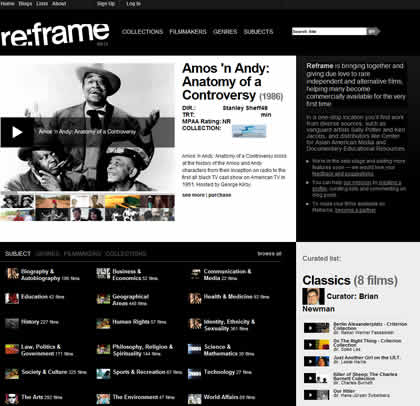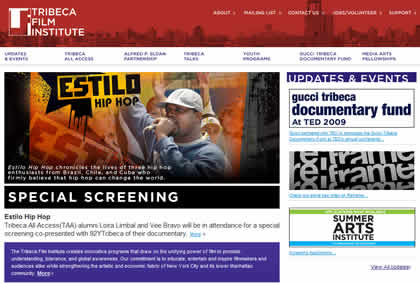BERLIN, Germany — Serious filmmakers and film collectors who find themselves inundated by the oceans of media flooding the internet will be happy to wash ashore onto the website Reframe (http://www.reframecollection.org). An adventurous new program from the Tribeca Film Institute, Reframe offers a simple solution to help them locate, purchase and otherwise wade through some of the world’s finest films and videos: listen to the recommendation of the world’s best film connoisseurs, and you’ll stay high and dry.
Backed by a non-exclusive partnership with Amazon as well as various major foundations, and headed by the Tribeca Film Institute’s CEO Brian Newman, Reframe’s goal is to help filmmakers, distributors, archives, libraries and other media owners digitize and sell their work through the internet. Using the recommendations of hundreds of film professionals and film connoisseurs worldwide, the site plucks often neglected and undistributed films and videos from off the shelf and delivers them onto the web in digitized format to create a one-stop shopping venue of professionally curated, critically-acclaimed media in all genres, from classic works of narrative fiction to avant garde, experimental and rarely-seen film and video projects.
Cinema Without Borders International Editor James Ulmer spoke with Newman during this year’s Berlin International Film Festival, where he found Newman fishing through the Berlinale’s own ocean of movies — and the advice of dozens of film professionals – to net the newest group of worthies for his digital Treasure Island.
CWB: Tell us about Reframe.
BN: Reframe is about finding your way through all the video on the web. There’s tons of video online and it should be on multiple platforms. Reframe is a very curated space where you can find some of the best films and videos that have been stuck on the shelf that we’re  digitizing and making available for the first time in years.
digitizing and making available for the first time in years.
CWB: There’s a flood of digital content out there in the world. What makes your site different from other sites that gather together movies for web viewing?
BN: Well, we’re very different from other sites in that we are very curatorial-based. So in addition to myself, we have tens if not hundreds of curators that are out there saying here are the best films on this topic. We’ll hire the person like John Hanhardt who was a curator of new media and film and video at the Whitney Museum and the Guggenheim and now at the Smithsonian, and he’ll say here are 10 of the best films from avant-garde cinema or from experimental cinema. Or we’ll have people like Witness, who are experts on human rights, and they’ll say here are some of the best films on human rights. We don’t have every film under the sun and we don’t try to have every film under the sun.
We’re also very different from other sites in that we’re not so much about the newest and latest film. We’re very much about, for example, an expert filmmaker like Ken Jacobs, a classic filmmaker of the American experimental film. And he had hundreds of films that were stuck on the shelf in tape format, and we helped him digitize them and make them available for the first time on Reframe.
CWB: Does Reframe emphasize any films that are exlcusive only to your site? That would seem to be very useful to attract eyeballs.
BN: We’re a non-exclusive site, in that every contract we sign with a filmmaker is completely non-exclusive. However, there are many films that you can truly only find on Reframe, and we’ve probably been pretty delinquent on our site in pointing that out – that these are only on Reframe. We’ll do better with that in the future.
However, our ultimate goal was actually to help these films get on every site. We’re not trying to be the exclusive site of anything…If we can help filmmakers get their films on to multiple platforms, then they can get revenue from all those platforms.
CWB: How does your site avoid being inundated by video and film submissions, and how do you assure your visitors that you are the best filter for them to watch high-quality film and video on the web?
BN: Well, I think you’re going to be inundated, and that’s our future. If you look back at music, no one used to say, darn, there are too many records in this record store. You would say, okay there’s millions of records but I’m gong to rely on the opinions of my friends, on the opinions of other musicians and DJs, et cetera, to help me cut through all the clutter and find the things I want. And with Reframe, that’s what we’re trying to do as well. We don’t really put a sign out there on the side of the film highway that says to every filmmakers ‘bring your stuff to us, we want everything under the sun,’ like a YouTube might do. We say, we’re going to work with some of the best distributors, some of the best archives, and with filmmakers who have a body of work. And we help digitize their work and make it available.
 We usually will only put a film up if one of our curators has selected it. And we have lots of curators. We‘ll go to them and say, where do you see stuff that’s missing on the web? For example, there’s a lot of dance on film that is not going to play in much more than probably a few film festivals, but it’s going to be very much of interest to dance scholars or people studying dance. So we’ll try to find some of those classics and put them on Reframe.
We usually will only put a film up if one of our curators has selected it. And we have lots of curators. We‘ll go to them and say, where do you see stuff that’s missing on the web? For example, there’s a lot of dance on film that is not going to play in much more than probably a few film festivals, but it’s going to be very much of interest to dance scholars or people studying dance. So we’ll try to find some of those classics and put them on Reframe.
CWB: I understand you have a new partnership with Amazon.
BN: One of the reasons we went with Amazon as our first partner – and we’re not exclusive to them, we’ll work with others in the future – is that Amazon was able to help us digitize all this content for free by working with one of their divisions called CreateSpace, So we were able to go out to people and get them to waive their usual fees and say we’ll digitize all this content and make it available.
The second thing is that Amazon does have somewhere north of 85 million customers, and they’re kind of a place where people trust putting their credit card to buy a film. So every film that goes on Reframe also goes onto Amazon, so you get into this great marketplace as a filmmaker.
CWB: How much digital projection and digitizing is the Berlinale doing for their own movies?
BN: That’s a great question. I think that Berlin has been one of the great leaders in terms of moving into the digital space and they’re showing a lot of showing digitally. I think also that in the future festivals like Berlin –= they are curators, and I think you’ll start to find them – they’re not doing this yet to my knowledge – but you’ll start to find them in the online space saying here’s some of the films we’re recommending, because we’re experts in this area.

